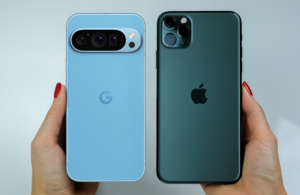According to research from Canalys (now part of Omdia), global shipments of smartphones fell marginally to 288.9 million units in Q2 2025, as modest consumer demand restricted market growth.
Samsung was the largest vendor in Q2, shipping 57.5 million smartphones, up 7 per cent year on year. Its performance was largely driven by its mass market-focused Galaxy A series. Apple finished second on the vendor ranking table, with iPhone shipments down 2 per cent at 44.8 million units. Apple’s performance showed strong resilience amid fierce competition in China and an inventory correction in the US as it adjusted to the rapidly changing tariffs. Xiaomi defended third place, shipping 42.4 million units, backed by particularly strong growth in Latin America and Africa. In fourth, vivo grew 2 per cent, shipping 26.4 million units, backed by strong growth in India, while TRANSSION came fifth, down 3 per cent to 24.6 million units.
“Q2 marked a key turning point for Samsung. It was the first quarter since Q4 2021 in which it recorded the strongest growth among the top five,” said Aaron West, Senior Analyst at Omdia. “Samsung has refocused its strategy on ‘smart volume,’ aiming to profitably scale its mass market Galaxy A series while continuing to grow its premium models. In particular, the entry-level A0x and A1x lines were key drivers in Q2, backed by the newly introduced Galaxy A06 5G, which helped Samsung gain traction in emerging markets. The S25 series maintained steady performance, even though any major uptake in demand from the new Galaxy S25 Edge failed to materialise. Additionally, Samsung’s performance in Q2 was boosted by frontloading of inventory into the US amid tariff concerns, with its shipments there increasing by a remarkable 38 per cent year on year.”
“While most vendors maintained stable overall performance in Q2, their success often hinged on strong momentum in specific regions to balance softer demand elsewhere,” said Manish Pravinkumar, Principal Analyst at Canalys. “The Middle East and Africa stood out as growth engines, each showing robust progress in Q2 2025. Across Africa, strategic government policies, increased vendor competition and a clear shift from feature phones to smartphones, supported by innovative financing models, are accelerating digital adoption. Meanwhile, in the Middle East, rising demand for premium devices was fueled by the growing popularity of ‘Buy Now, Pay Later’ options, a successful Eid Al-Adha sales period and coordinated efforts by vendors and retailers to drive sell-through ahead of a busy H2 launch calendar.”
Another key highlight in Q2 came from outside the top five from Nothing, which grew 177 per cent year on year, surpassing 1.0 million quarterly shipments for the very first time. Nothing’s route to becoming the strongest growing vendor worldwide was predominantly driven by its successful investments in India.
“With a flattish outlook for the full year, vendors are prioritising profitability with short-term tactical gains and long-term strategic investments,” added Sheng Win Chow, Senior Analyst at Canalys. “Stringent cost control and optimised enterprise resource planning are priorities for all the major vendors, as past high ambitions have to be adjusted to 2025’s reality. Many vendors are betting on a hectic launch season in Q3, focusing on topics such as AI, foldables and slimness, to reboot demand ahead of the holiday shopping season toward the end of the year. But vendors need to remain cautious in how they approach the market as consumer sentiment remains modest. Also, downward market corrections post inventory build-ups in the US and the fading effect of China’s subsidy scheme will contribute negatively. It will be vital for vendors to work closely with their channel partners to find opportunities and balance inventory levels, which will be key to avoiding any errors that can hamper ambitions for 2026.”
